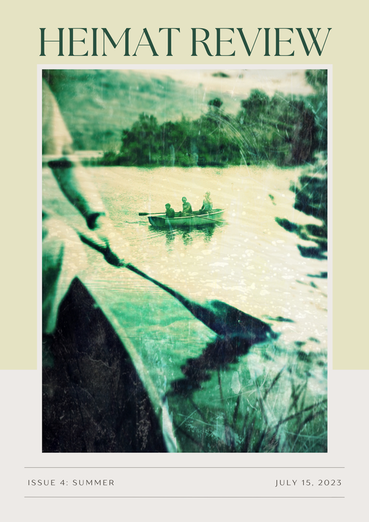Maybe Today
By Hilary Ayshford
July 15, 2023
July 15, 2023
Maybe it will be today. The steam organ on the carousel wheezes and groans into life and the procession begins, glinting gold in the mid-morning sun. Marie-France puts down her newspaper and stares out of the window of her first-floor apartment in the Place de l'Espoir, over the tops of the umbrellas, past the coffee-sippers and croissant-nibblers, to watch the horse trying to catch up with the seashell carriage, pursued by the vintage car, chased by the fire engine with the clanging bell, followed by the tractor and the motorbike and the helicopter escaping from the tiger.
Louise was four years old, her chubby legs gripping the flanks of the horse, its head rearing to display flared red nostrils and white tombstone teeth, her pudgy hands holding the golden barley sugar twist of the pole in a death grip. From the pavement café, Marie-France waved to her the first, second, third time she went round, but maybe she was distracted by the attentions of the handsome man at the next table. She didn't notice when the ride ended and Louise's white steed was on the opposite side of the carousel, didn't see her climb down and wander off along the road that leads to the river. The gendarmes searched, but they didn't find her. Maybe Marie-France will see her daughter again. Maybe it will be this morning.
###
In the warmth of the afternoon, Juliette lingers over her grand crème, moving her chair slightly further into the shade as the sun creeps round the square. She watches the inexorable turning of the carousel from the same table where she sits every day, week after week, month after month, year after year. The thought of missing a single day terrifies her.
Noémie was twenty-one years old, huddled with her lover in the seashell carriage with its green dolphin motif, his arm around her shoulder, her face nestled against his chest. With every rotation they made another promise to each other, shaped elaborate plans. Maybe he took her hand as they climbed out of their cosy cocoon and didn't let go, sliding a ring onto her finger, before he carried her off to the other side of the world. Daily calls to Juliette became weekly, then monthly, turning into occasional text messages and cards at birthdays and Christmas. Maybe she'll return one day. Maybe it will be this afternoon.
###
In blue light of the gathering dusk, Madeleine watches from the window of her patisserie as the carousel gathers speed, the gilded paintwork and glowing lightbulbs blurring into a kaleidoscope of colours and shapes.
Camille was fourteen years old, allowed out on her own in the evening for the first time, giddy with the joy of being young and alive. She sat in the fire engine, ringing the bell incessantly, drunk on teenage excitement, encouraged by the shouts and laughter of her friends. When the ride ended maybe a stranger took her hand and, forgetting or ignoring Madeleine's warnings, she let him lead her away down an alley to an empty house. He gave her a pill, which became white powder, which became a needle. Maybe she is trying to find her way back. Maybe it will be tonight.
###
The carousel slows, creaks to a halt; the steam organ sighs and groans out its last breath. In the silence, the women wait, each hoping to see her daughter emerge from the far side of the square, wave and call out “Maman, c'est moi”. But nobody climbs down off the horse, clambers out of the shell-shaped carriage or alights from the fire engine.
Not today, then.
Marie-France sighs and returns to her newspaper. She stares unseeing at the meaningless words, the grainy photos of politicians and celebrities, then turns to the crossword. Juliette's shoulders slump as she drains the thick, white china cup, then delicately wipes the faintest trace of foam from her top lip with the paper serviette. She leaves a few coins on the table and goes back to her shady garden. Madeleine finishes wiping down the shelves, and stands in the window, gazing out until it is too dark to see anything. She turns the sign on the door to 'Fermé' and makes her way home across the emptying square.
Maybe it will be tomorrow.
Louise was four years old, her chubby legs gripping the flanks of the horse, its head rearing to display flared red nostrils and white tombstone teeth, her pudgy hands holding the golden barley sugar twist of the pole in a death grip. From the pavement café, Marie-France waved to her the first, second, third time she went round, but maybe she was distracted by the attentions of the handsome man at the next table. She didn't notice when the ride ended and Louise's white steed was on the opposite side of the carousel, didn't see her climb down and wander off along the road that leads to the river. The gendarmes searched, but they didn't find her. Maybe Marie-France will see her daughter again. Maybe it will be this morning.
###
In the warmth of the afternoon, Juliette lingers over her grand crème, moving her chair slightly further into the shade as the sun creeps round the square. She watches the inexorable turning of the carousel from the same table where she sits every day, week after week, month after month, year after year. The thought of missing a single day terrifies her.
Noémie was twenty-one years old, huddled with her lover in the seashell carriage with its green dolphin motif, his arm around her shoulder, her face nestled against his chest. With every rotation they made another promise to each other, shaped elaborate plans. Maybe he took her hand as they climbed out of their cosy cocoon and didn't let go, sliding a ring onto her finger, before he carried her off to the other side of the world. Daily calls to Juliette became weekly, then monthly, turning into occasional text messages and cards at birthdays and Christmas. Maybe she'll return one day. Maybe it will be this afternoon.
###
In blue light of the gathering dusk, Madeleine watches from the window of her patisserie as the carousel gathers speed, the gilded paintwork and glowing lightbulbs blurring into a kaleidoscope of colours and shapes.
Camille was fourteen years old, allowed out on her own in the evening for the first time, giddy with the joy of being young and alive. She sat in the fire engine, ringing the bell incessantly, drunk on teenage excitement, encouraged by the shouts and laughter of her friends. When the ride ended maybe a stranger took her hand and, forgetting or ignoring Madeleine's warnings, she let him lead her away down an alley to an empty house. He gave her a pill, which became white powder, which became a needle. Maybe she is trying to find her way back. Maybe it will be tonight.
###
The carousel slows, creaks to a halt; the steam organ sighs and groans out its last breath. In the silence, the women wait, each hoping to see her daughter emerge from the far side of the square, wave and call out “Maman, c'est moi”. But nobody climbs down off the horse, clambers out of the shell-shaped carriage or alights from the fire engine.
Not today, then.
Marie-France sighs and returns to her newspaper. She stares unseeing at the meaningless words, the grainy photos of politicians and celebrities, then turns to the crossword. Juliette's shoulders slump as she drains the thick, white china cup, then delicately wipes the faintest trace of foam from her top lip with the paper serviette. She leaves a few coins on the table and goes back to her shady garden. Madeleine finishes wiping down the shelves, and stands in the window, gazing out until it is too dark to see anything. She turns the sign on the door to 'Fermé' and makes her way home across the emptying square.
Maybe it will be tomorrow.
Hilary Ayshford is a former science writer and editor living in rural Kent in the UK. She writes mainly short form fiction, encompassing everything from humour to horror, historical to speculative, and is currently working on a novella-in-flash. Her work has been published by Retreat West, Roi Fainéant, Trembling With Fear, Funny Pearls and After Dinner Conversation, among others.

